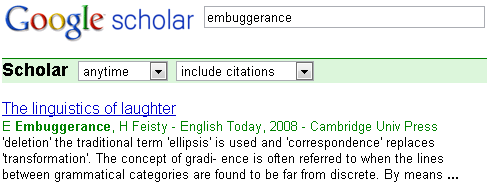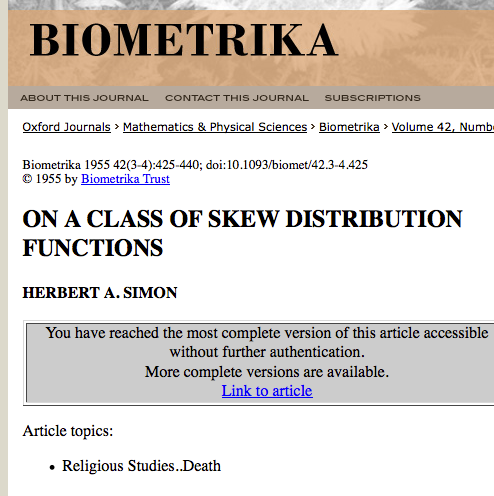Archive for Computational linguistics
Statistical MT – with meter and rhyme
I promised in an earlier post to report on some of the many interesting presentations here at InterSpeech 2010. But various other obligations and opportunities have cut into my blogging time, and so for now, I'll just point you to the slides for my own presentation here: Jiahong Yuan and Mark Liberman, "F0 Declination in English and Mandarin Broadcast News Speech".
I still hope to blog about some of the other interesting things I've learned here, but it's already time for me to head out on the next leg of my journey. Worse, I've already got a list of things to blog about from the next conference where I'm co-author on a presentation, EMNLP 2010 — which hasn't even started yet. At the top of that list is Dmitriy Genzel, Jakob Uszkoreit and Franz Och, "'Poetic' Statistical Machine Translation: Rhyme and Meter".
Read the rest of this entry »
Sproat asks the question
The "Last Words" segment of the latest issue of Computational Linguistics is by Richard Sproat: "Ancient Symbols, Computational Linguistics, and the Reviewing Practices of the General Science Journals". Richard reviews and extends the analysis (partly contributed by him and by Cosma Shalizi) in "Conditional entropy and the Indus Script" (4/26/2009) and "Pictish writing?" (4/2/2010), and poses the question that I was too polite to ask:
How is it that papers that are so trivially and demonstrably wrong get published in journals such as Science or the Proceedings of the Royal Society?
Read the rest of this entry »
A synthetic singing president?
A couple of days ago, Gary Marcus told me about the Beatles Complete on Ukulele project, and introduced me to its creator, David Barratt.
Gary got involved because he's working on a book about "learning to become musical at the age of 40", and so he's joining a roster of performers that includes the Fort Greene Childrens Choir (Age 7 and Under Section), Samantha Fox, and many others (82 so far), recording voice-and-ukulele versions of all 185 songs in the Beatles catalog. Gary is of course singing With a Little Help from My Friends (because, he explains, "otherwise I couldn't carry a tune in a bucket"), and his contribution is scheduled to be released on July 19, 2011.
So how does Language Log come into this? Well, David wants to recruit Barack Obama to sing Let it Be, and Gary thought that I could help. In turn, I believe that YOU can help.
Read the rest of this entry »
The long tail of religious studies?
Google Books isn't the only outfit that sometimes has trouble with metadata. I happened to notice this morning that Oxford University Press has classified Herbert A. Simon's "On a class of skew distribution functions" (Biometrika 43:425-440, 1955) as "Religious Studies..Death":
Read the rest of this entry »
South Hadley & surrounded by trees
Reader FM wrote to draw our attention to what he thought might be "another example of poor machine reading, à la Embuggerance and Feisty". FM is referring back to this epic error, where a line in a review listing interesting vocabulary items
embuggerance, elevate, feisty, holistic,
somehow attracted the attention of an algorithm for un-inverting comma-separated lists of author names, resulting in the hypothetical author pair "Elevate Embuggerance and Holistic Feisty", and a striking citation in Google Scholar:
 ;
;
Read the rest of this entry »
Dialect geography and social networks
There are a variety of factors that are believed to be involved in the establishment and maintenance of the language varieties that are commonly called "dialects". Among these are substrate or contact influences, patterns of initial settlement, group identity, and patterns of communication. Some of these factors, such as settlement patterns, mainly re-distribute existing variation in geographical and social space. But others, such as patterns of communication, affect the way that innovations arise and spread.
The rise of internet-based social media offers new pictures of such patterns of communication, and a few months ago, I came across an interesting analysis of the geography of Facebook friend links: Pete Warden, "How to split up the U.S.", 2/6/2010.
Read the rest of this entry »
Mapping the Demographics of American English with Twitter
[This is a guest post by David Bamman.]
It took me a while to really make sense of Twitter. For the longest time, it was (to me) the stomping ground of 14-year-olds and Ashton Kutcher, each issuing a minute-by-minute feed of their lives. Around the time Twitter arrived, however, I had just had a breakthrough on YouTube's enormous popularity – it was only after watching a dozen different videos of the Super Mario Brothers theme song performed a dozen different ways that I finally got it: I may not care about cats playing the keyboard or wedding parties dancing down the aisle, but somebody does, and without a distribution system for people to broadcast whatever their hearts felt like, I never would have had my life improved by that kid with the beatboxing flute or the one with the double guitar.
So I waited for a similar breakthrough with Twitter. It came, at long last, after I realized that it was exactly what I first thought it was: 14-year-olds (and Ashton Kutcher) chronicling the minutiae of their lives. It is colloquial language, constrained by 140 characters: everyday conversations about waiting in line at the grocery store, your flight just landing at ORD, what to do this Saturday night, "omg did u see hr dress?" In spurts it is, of course, much more than that, as its use during the protests of the 2009 Iranian election proved, but in its unmarked use, it's the language of how millions of people across the world talk to their friends.
Read the rest of this entry »
Free Summer School
Busy June 20 – June 26? Could you manage to squeeze one of the most intellectually intense weeks of your life into your summer schedule? For free?
 I'm talking (once again!) about the North American Summer School in Logic, Language, and Information (NASSLI 2010), of which I am program chair. It's aimed at graduate students, researchers, and advanced undergraduates, in fact anyone interested in formal approaches to language, philosophy, and computation. And I bring you, Language Log reader, some hot news that gives you the chance of attending the school and making 100-150 new friends for life for free… provided you apply by June 1.
I'm talking (once again!) about the North American Summer School in Logic, Language, and Information (NASSLI 2010), of which I am program chair. It's aimed at graduate students, researchers, and advanced undergraduates, in fact anyone interested in formal approaches to language, philosophy, and computation. And I bring you, Language Log reader, some hot news that gives you the chance of attending the school and making 100-150 new friends for life for free… provided you apply by June 1.
Here's the news (and this is aimed at students). The National Science Foundation has given preliminary approval for a sizable grant to NASSLLI 2010. Together with other funds we have raised this will enable us to provide students with financial support to attend the school. We expect to be able to reimburse the registration fees of about 40 deserving students, and to pay further travel expenses for those whose need is greatest. You can find online information on how to register and how to apply for the grants – see the Support is Available from NASSLLI Itself section on the NASSLLI grants page. Basically, you need to send NASSLLI an email with a reason why NASSLLI is relevant for you, and have your academic advisor send an email too.
I'm really, really looking forward to meeting many of you in Bloomington, Indiana at the end of next month, and if you want to ask me personally about it, send me an email.
Death or birth?
The most recent IEEE Signal Processing Society Newsletter has an interesting article by David Suendermann, "Speech scientists are dead. Interaction designers are dead. Who is next?".
His argument is that "Commercial spoken dialog systems can process millions of calls per week", and therefore "one can implement a variety of changes at different points in the application and randomly choose one competitor every time the point is hit in the course of a call", using techniques like reinforcement learning to adaptively optimize the design. As a result, "the contender approach can change the life of interaction designers and speech scientists in that best practices and experience-based decisions can be replaced by straight-forward implementation of every alternative one can think of".
Read the rest of this entry »
Second. Best. Summer. School. Ever.
 NASSLLI 2010 is a week long summer school that offers 15 superlative graduate level courses and workshops on Language, Logic and Information from leading scholars, plus pre-session tutorials to bring you up to speed. And the price is incredibly low, just $150 for the entire week if you're a student and register by May 1.
NASSLLI 2010 is a week long summer school that offers 15 superlative graduate level courses and workshops on Language, Logic and Information from leading scholars, plus pre-session tutorials to bring you up to speed. And the price is incredibly low, just $150 for the entire week if you're a student and register by May 1.
"Second best"? We'll come to that.
Read the rest of this entry »
Uh accommodation?
In the course of an enjoyable conversation over lunch yesterday, Michael Chorost asked whether disfluency is contagious, in the sense (for example) that talking with someone who uses "uh" a lot would tend to lead you to behave similarly. This seems plausible, since such effects can be found in most other variable aspects of speech and language use, so I promised to check — with a warning that causation is especially difficult to infer from correlation in such cases.
Read the rest of this entry »
Pictish writing?
According to Jennifer Viegas, "New Written Language of Ancient Scotland Discovered", Discovery News, 3/31/2010:
Once thought to be rock art, carved depictions of soldiers, horses and other figures are in fact part of a written language dating back to the Iron Age.
The ancestors of modern Scottish people left behind mysterious, carved stones that new research has just determined contain the written language of the Picts, an Iron Age society that existed in Scotland from 300 to 843.
The "new research" is described in Rob Lee, Philip Jonathan, and Pauline Ziman, "Pictish symbols revealed as a written language through application of Shannon entropy", Proceedings of the Royal Society A, in press.
Read the rest of this entry »
